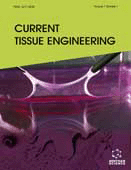Abstract
Background: The present study evaluates the benefits of associating bone marrow-derived mesenchymal stem cells (MSCs) with pharmacologically active microcarriers (PAMs) on cartilage healing in horses.
Methods: This experimental study was carried out on ten standardbred horses with an induced cartilaginous lesion on the articulation of the fetlocks and with a follow-up of two months. Autologous MSCs, isolated from the bone marrow, were associated with either platelet-rich plasma (PRP), PAMs (functionalized with fibronectin and releasing or not TGF (Transforming Growth Factor)-β3) and injected into the joint 5 days after the creation of the lesion. A postoperative rehabilitation protocol was followed with a clinical and radiological follow-up. Two months after the injection, computed tomodensitometry (CT), magnetic resonance imaging (MRI) and histological examinations were performed on ex vivo samples of the joints.
Results: MSCs associated with PAMs releasing TGF-β3 significantly improved cartilage repair as assessed by histological analyses for tidemark presence and glycosaminoglycans content (p<0.05), while no effect of the treatment was evident at macroscopic examinations. In addition, the MSCs combined with PAM-TGFβ3 ameliorated these histological results when compared to MSCs with PAMs. These observations were supported by UTE (ultrashort time echo) sequences in the MRI images (p<0.0001).
Conclusion: A significant improvement in cartilage repair was detected based on histologic and UTE-MRI analyses in joints treated with MSCs associated with PAM-TGFβ3.
The association of equine MSCs with PAMs releasing TGF-β3 could be a novel therapeutic strategy for cartilage repair in athletic horses.
Keywords: Chondrogenesis, cartilage repair, horse, mesenchymal stem cells, microcarriers, regeneration, TGF-β3.
 11
11

